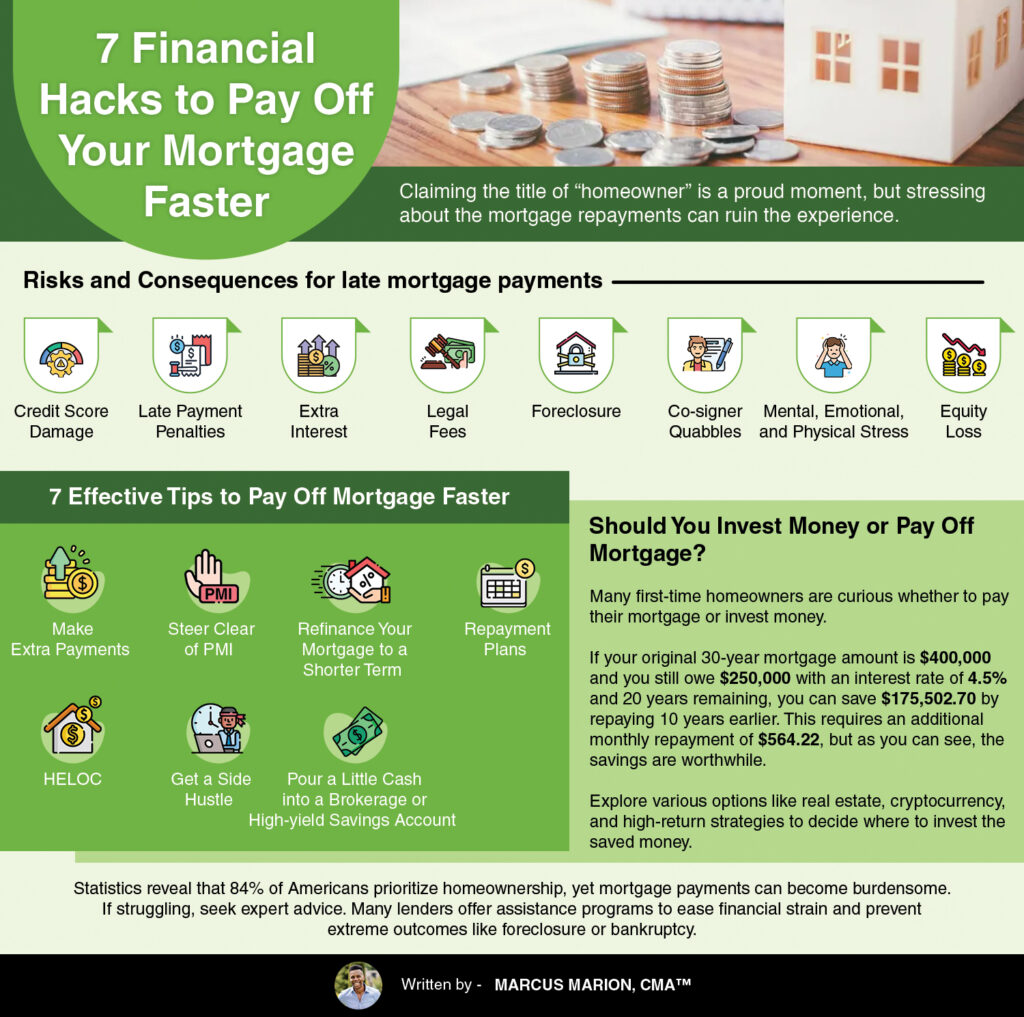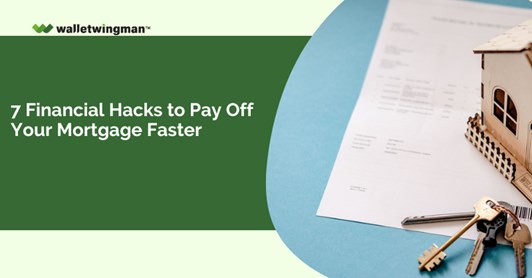Taking the leap and buying your first residential property is a rite of passage, as is finalizing your mortgage payments. Monthly mortgage payments set the average American back $1,297, and according to the American Housing Survey (AHS) from the United States Census Bureau, the median monthly mortgage payment rests at $975.
Claiming the title of “homeowner” is a proud moment, but stressing about the mortgage repayments can ruin the experience. Unfortunately, for a lot of homeowners, the second scenario rings true. However, it doesn’t have to be that way.
If you are keen to embellish your front door with a winged bald eagle – as many U.S. homeowners do to symbolize their freedom from costly mortgage fees – you may be interested in paying off your mortgage early. Faster repayment means faster homeowner independence, so put your feet up and read on.

Why is it Important to Pay Mortgage?

Approximately 82% of young Americans aged 22-30 who sign a house contract do so for the first time. Wherever you make family memories and rest your head at night, there is no dodging the repayment. As many unfortunate people discover, failing to pay off a mortgage can cause serious problems beyond finances.
Mortgage-related stress is rampant nationwide, with the people of San Francisco experiencing the most stress due to mortgage repayments. Let us look at some of the risks and downsides associated with late mortgage payments (or none at all):
- Credit Score Damage – Nobody wants a red credit rating, but if you miss mortgage payments, your rating will sink faster than an iceberg sinks a ship. Poor credit impacts many things, including the ability to obtain loans and future housing opportunities.
- Late Payment Penalties – If you muddle up your repayments, expect to get hit with a late payment fee. This may result in deeper debt that you will need help to get out of.
- Extra Interest – Lenders might increase the overall interest rate if they feel that you are causing them to be out-of-pocket. Plus, when you miss payments, the interest stacks up and can sometimes be higher than the actual cost of your house!
- Legal Fees – Continuously missing payments on your mortgage will result in legal action, meaning you’ll have to foot the bill for court costs. Property reclamation and the repossession of belongings are also common, so don’t risk it.
- Foreclosure – When foreclosure happens, it is game over. Your dreams of being a homeowner will turn to dust, and you must find a place to sleep. Moreover, you’ll need to find a way to repay the unpaid balance.
- Co-signer Quabbles – Whoever you choose as your co-signer will experience the same setbacks regarding missing payments. Besides the negative impact on your credit score, theirs will also tumble into oblivion.
- Mental, Emotional, and Physical Stress – If you’re not careful, money woes can take over your life. Many people with money problems cannot sleep, eat, or maintain normal relationships, so don’t let yourself be one of them.
- Equity Loss – Even if your home grew in value after you initially signed the mortgage plan and moved in, you won’t be able to benefit if you miss a payment (or more than one.)
How to Pay Off Mortgage Faster: 7 Effective Tips

Statistics demonstrate that 62% of Americans think they should pour a 20% down payment into their home, even though 5% is the typical requirement that lenders present to homebuyers.
However, no matter how much money you initially used to secure your family home, the truth is that you will need to pay the rest eventually. Homeowner freedom requires the unshackling of financial chains that bind you.
Don’t worry if you’re still in deep because there are multiple ways to get out of property debt quickly. Let’s look at seven of the best ways to escape those dreaded monthly mortgage payments:
1. Make Extra Payments
The most brilliant way to pay off your mortgage (and the simplest way) is to part ways with your money more regularly. Instead of treating yourself to that new pair of shoes or dining out multiple times weekly, use the extra cash to make additional payments. Your lender will be happy, and the extra payments may even reflect on your credit score. Just one extra monthly payment adds up to 52 extra payments annually, meaning that freedom is on the ever-closer horizon.
2. Steer Clear of PMI
Every homeowner who invests less than 20% on their home at the beginning will have private mortgage insurance (PMI) on their property loan. This insurance doesn’t benefit you. Rather, it safeguards the lender and costs you a lot of money. Fortunately, you can eliminate PMI from your mortgage plan once your home equity exceeds the 20% threshold. Ultimately, you will save heaps on your monthly outgoings, with most homeowners slashing them by hundreds of dollars when they remove PMI.
3. Refinance Your Mortgage to a Shorter Term
Replacing your existing mortgage with a new one requires deep thought and sufficient financial guidance. Don’t go it alone because lenders commonly disqualify uneducated homeowners who try to refinance while drowning in debt. Although refinancing can be time-consuming and stressful, you may find a plan with more desirable interest rates. Consequently, lower interest fees mean less time to repay.
4. Repayment Plans
Speaking to the lender who deals with your mortgage payments is advisable because they will be able to recommend a repayment vehicle to assist you. Endowment policies, property and asset investment, unit trusts, pensions, and stocks and shares ISAs are some examples of things that can be used as a substitute for money to repay mortgages. These methods come with risks, so educate yourself before diving in.
5. HELOC
When you choose a HELOC strategy to pay off your mortgage, you can expect flexibility. Before you start visualizing yourself spreading your wings and flying away from the restraints of mortgage payments. Remember that this line of credit is a type of debt, so you must approach it cautiously. Additionally, the amount you get depends on the equity level of your home. After all, you will be borrowing against it. Once you celebrate the approval process, you can draw funds over a 10-year period and will be able to repay it with varying rates of interest over 20 years.
6. Get a Side Hustle
Repaying your mortgage faster will be easier if you start generating some extra money. Many side gigs can deliver a full-time income, and if you don’t fancy walking the neighbor’s dog or designing and selling t-shirts, you can monetize your YouTube channel. You can try your luck as an appointment setter, sell handmade thrifts on an e-commerce store, and even share your opinions via a podcast that earns money from advertising.
7. Pour a Little Cash into a Brokerage or High-yield Savings Account
This one comes in last because it requires a slight upfront investment. The good news is that you can decide how much money you want to put into it. But it goes without saying that the more you invest, the higher the profits (and the risk!) If you get lucky with this option, you can use the earnings to repay the outstanding you owe on your home.
Should You Invest Money or Pay Off Mortgage?

Many first-time homeowners are curious whether to pay their mortgage or invest money. The choice is yours, but if you’re not currently in a financial situation to funnel extra funds into a side venture, such as stocks and bonds, it is wise to repay a mortgage.
If your original 30-year mortgage amount is $400,000 and you still owe $250,000 with an interest rate of 4.5% and 20 years remaining, you can save $175,502.70 by repaying 10 years earlier. This requires an additional monthly repayment of $564.22, but as you can see, the savings are worthwhile.
Even if you decide to repay your mortgage early, you can still set aside time to learn how to invest and make money daily. There are multiple options at your disposal, and by learning how much money you need to invest in real estate, cryptocurrency, digital assets, and other high-return strategies, you can decide where to invest the money you save from early mortgage repayment.
Conclusion
Statistics show that 84% of Americans prioritize homeownership over many other investments. Although being a homeowner is a priority for most, mortgage payments can weigh heavy on your mind and your life. If the burden is unbearable, it’s worth opening to an expert.
Assistance programs are standard with most lenders, so you can streamline the process and avoid digging yourself into a deeper hole financially. These programs aim to prevent the worst-case scenarios from occurring, such as foreclosure or bankruptcy.
Lenders might even be able to modify the loan to reduce the associated interest. But this is not guaranteed, and you ought to compare as many lenders before you put your trust in one.
Don’t put all your eggs in one basket by limiting your conversations to just the lender. Because, you can also consult with other legal professionals, such as housing advisors and financial counselors.


